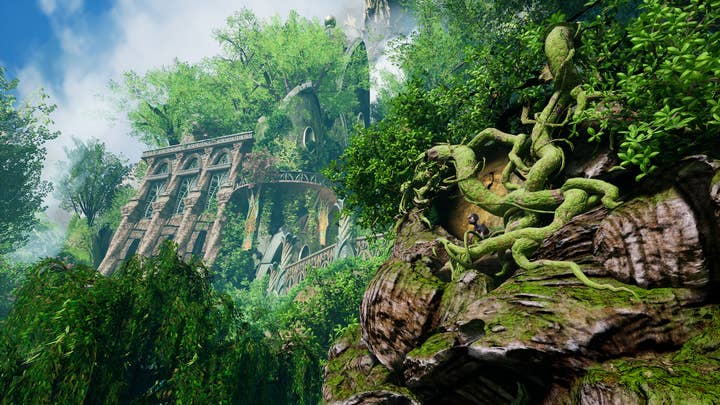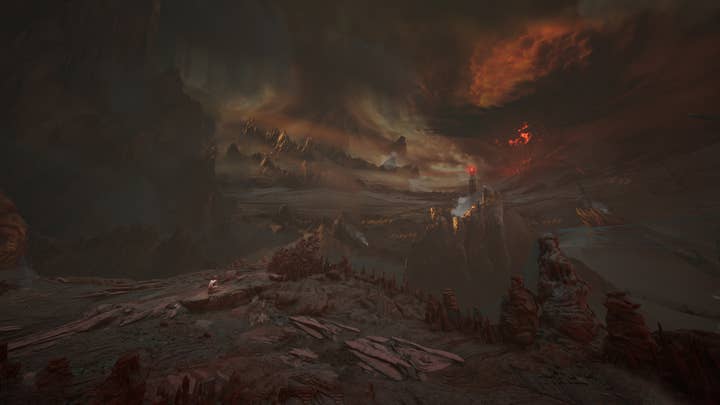Daedalic goes there and back again with Gollum
Head of publishing Jonas Hüsges talks delays, being acquired by Nacon, and renewed interest in the Lord of the Rings IP
It's been an eventful journey for The Lord of the Rings: Gollum since Daedalic announced it in 2019.
Earlier this year, Daedalic was acquired by Nacon. Embracer acquired the Lord of the Rings IP from historical owner Middle-earth Enterprises. The game was pushed back from two possible release windows.
Nacon had already been announced as Gollum's co-publisher in 2021, so at least Daedalic's new owner was already on the same page in regards to the project.
"We worked with them for over a year on Gollum already, in co-publishing, so you know how the other party operates, and you know the ins and outs and the [company's] philosophy," Daedalic head of publishing Jonas Hüsges tells GamesIndustry.biz.
"In terms of strategy, really, we still operate very independently. The great thing about the Nacon/Daedalic dynamic is that we have very different portfolios. They come from console primarily – they have sports and racing games, and action-adventures like Gollum – and then we do the indie games, strategy, mostly PC, adventure games, online, co-op, multiplayer games, stuff like this. And really, it's a very good combination. So we don't have a huge overlap in the titles that we're interested in, but instead we can complement each other."
"We don't have a huge overlap [with Nacon] in the titles that we're interested in, we can complement each other"
As Hüsges points out, Daedalic has historically been more known for indie titles rather than big action-adventure games like Gollum, but he's keen to highlight that "the publishing and the internal development have always been a little bit different."
He touches upon the publishing arm's roots in story-driven adventures games such as Machinarium and Divinity Original Sin, and adds that the internal development teams have, over time, tackled more ambitious titles.
"Gollum is obviously a much much bigger project than our publishing titles, which is also why we felt it was appropriate to co-publish it with a company like Nacon that has a lot of experience in that specific field."
He continues: "For us the dynamic of Gollum is different, I would say, from the other games that we've published. If you publish indie games, you have to fight for coverage a lot. And the thing we felt with Gollum very early on was that if we did something exclusive with one website, it took IGN five minutes to have it on their front page. And this is not the dynamic we have with indie games at all."
Hüsges reiterates the importance of having partnered with Nacon on the publishing side of the project, which brings expertise both in getting big titles to market, but also in specialised areas such as retail.
"It was good to have someone like Nacon who's very experienced in working with these larger IPs. Again, the profiles are different. We stopped doing retail in early 2019. For indie games, $20 [physical] games don’t make that much sense anymore. So we stopped doing this all together. But for a mainstream product like The Lord of the Rings you want to do retail, you want to be in stores, you want to be where the audience is. And so, for [Gollum] it made sense for us to find a partner that's very strong in that world and, Nacon, because they also make accessories, will always have that footprint. That's half of their business – accessories and hardware.

"And we hear positive feedback from retailers as well. They understand that this is a brand that they can put front and centre in their stores and that will resonate with people who just walk about, because they immediately understand what they're getting and what the product is."
As for the Lord of the Rings IP being acquired by Embracer, Hüsges says that they "haven't been impacted by it all." It's worth noting that, at the time of that conversation at Gamescom, it had only been a couple of weeks since the announcement of the deal, so things may have evolved since.
"The leadership team at [Middle-earth Enterprises] stays on and we have a very, very good relationship with them," Hüsges adds. "They've been super supportive throughout and really a good partner, and we fully expect that to continue."
JRR Tolkien's work has experienced somewhat of a renewed interest in the past year or so. Not that the IPs have ever been abandoned (the success of Warner Bros' Shadow of War and Shadow of Mordor proves it) but a few projects were recently announced and/or launched in quick succession.
There's obviously Embracer, looking to explore "additional movies based on iconic characters" among other experiences, but also the Amazon series The Rings of Power that just released, Epic Games announcing survival title Return to Moria, and Weta Workshop and Private Division working on a new Lord of the Rings game.
We ask Hüsges how he feels about this renewed interest and whether there's a worry about these various experiences finding an audience (and consequently, whether Gollum will find its audience).
"Right now it's very exciting to be a Lord of the Rings fan"
"What's interesting is that we are now seeing a lot of titles based on the Lord of the Rings that explore very different elements," he answers. "So, in the past, you had the [Peter Jackson] movies, you had games based on the movies that were very closely tied to the main storyline of the trilogy. And now, the Amazon series takes place in the Second Age, so it's a completely different era of the Lord of the Rings. And then the Moria game that comes out on the Epic Games Store, that one is exploring a very specific location and telling a very specific story.
"Right now, we are probably the closest to the main storyline of the [Peter Jackson] trilogy, but we're exploring it from this completely different angle. And while there are hints at Gollum's journey in the Fellowship, it's never been really fully explored, right? We know a lot about his back story and this, again, if you read the novels very carefully, there's instances where Gandalf tells some parts of his journey but we've never been able to really experience that.
"So I feel like, yes, there's a lot of interest and I think that's great, but so far I don't think it's over-explored, there's a lot of different angles and different visions and that's the strength. Long term, who knows… This is a new wave, right? But I think right now it's very exciting to be a Lord of the Rings fan."

Gollum was initially due to release in 2021 but got pushed back to September 2022, before being delayed "by a few months" earlier this year. When we bring up the change in release windows, Hüsges takes issue with us mentioning the title being delayed "twice" and reflects on players' expectations around release dates, when the reality of game development means it’s often very difficult to predict accurately when the game might be finished.
"I don't like the notion of the first delay," he says. "Technically we did announce that it might come out in 2021. But this was really early, when we basically were giving a timeframe. So when I saw the headlines of 'The Gollum game got delayed' I was like: sure, okay... On a technicality, it got delayed…
"This time, [in July], it got delayed, absolutely. We announced a release date, we didn't meet it. We think the game needs a bit more time so we haven't announced a new date yet. I mean, the challenges are plenty. This is a big project, everyone wants to get it right. That's a lot of internal and external pressure. It's a big IP, it's a big responsibility and we want to do it justice. And then [there's] a lot of things that impact game development in general, like COVID. We used to be a very 'in-studio' studio, in Hamburg. And now, we're fully remote. But this is a big culture change."
"Throughout the process, there's these little hiccups. It's game development. There's always something"
While the company transitioned to remote working "relatively quickly," Hüsges adds, he says that there are always some elements where you would benefit from having "people in one room more often." Gollum's development also happened right in the middle of a generation change.
"When we started production, the new consoles weren't out yet, so we learnt a lot about them and the hardware, and it was difficult to get dev kits, and it is now difficult to get retail versions of them. So, throughout the process, there's these little hiccups. It's game development. There's always something. And I think we just wanted to make sure that we take the appropriate amount of time."
He continues: "If we get this right, hopefully this will be seen as the way Gollum's story is perceived and happens, and then we will move on to a different part of the universe. And hopefully make another Lord of the Rings game, but exploring something else."
Daedalic always intended to do more than one game in the Lord of the Rings universe, as CEO Carsten Fichtelmann told GamesIndustry.biz in 2019.
But while Gollum has a lot to do with the reason why the company is in the spotlight as of late, as we finish our chat, Hüsges is keen to remind us that there is more to Daedalic, especially on the publishing side.
"We have a pretty broad portfolio but we started doing a lot more co-op games and multiplayer games, and those are actually a big business drivers for us. If you look at Unrailed, for example, which is a super small team from Switzerland, making a new co-op experience, and having it on all platforms with cross-play everywhere.
"Or if you look at Barotrauma, which started as a single dev project then went on to become a small studio called FakeFish, and now we publish it worldwide. [It sold] two million units and it's still in Steam Early Access, it's a big indie hit. And I think this is the exciting part for me, working with these small teams and hopefully seeing their games blossom and be successful, and work with them over a long time."



